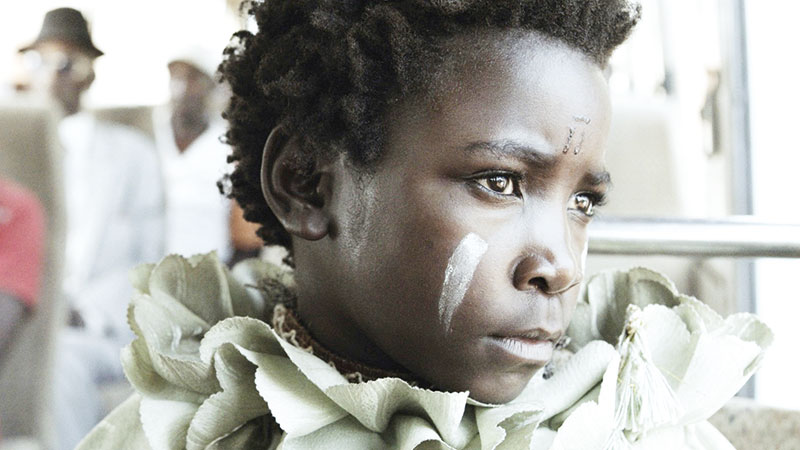A bus containing European tourists drives up a dirt track in rural Zambia. It stops, and its passengers disembark to be greeted by the sight of a group of old women, seated in the dust, their faces powdered white and their bodies attached to heavy wooden reels, suspended on poles, by long white ribbons. This, we’re told by a softly spoken guide, is a witch camp. The ribbons, the guide continues with unnerving matter-of-factness, are merely a protective measure to stop the old women from flying away and practising their craft.
This is the opening scene of Rungano Nyoni’s arresting debut feature I Am Not a Witch. The camp clearly holds a foreign appeal for those trigger-happy western tourists, but Nyoni, raised in Wales, born in Zambia, is playing a far more interesting game. Her film is a compelling, bracingly bold high-wire act. Centred around a young girl accused of being a witch, the film is at once a surreal and straight-faced treatment of a subject that could so easily have been turned into exotic spectacle. It’s rare for British-funded productions, as this is, to be so adventurous, rarer still for first features, so for all its flaws this mix of social satire, magical realism, political critique and coming-of-age drama is distinctive.
It revolves around nine-year-old orphan Shula (played with a watchful intensity by Maggie Mulubwa). At a village tribunal presided over by a young police officer with a kind of glazed disinterest that introduces a nice note of comic absurdity, Shula is accused of being a witch. She ends up harnessed to a reel with the old women at the camp as they are driven on a flatbed truck from field to field where they are forced by male overseers to work the land.
Acting as a kind of unofficial – and wholly unsuitable – guardian to Shula is the manager of the witch camp Tembo (John Tembo), a government official with a politician’s smile, a bullying temper and an unscrupulous eye for a quick buck. He touts her around, offering her witchcraft services and pocketing the spoils.
“Are you a goat or a witch?”, Shula is asked by a holy man at a ceremony at the start of the film
The fact that Shula has little idea what she has to do – witchcraft lessons are, at one point, relayed to her by an older woman via a smartphone – only underlines the exploitative nature of Tembo’s interest in her. And indeed the exploitation of young girls and older women in society at large emerges as one of the thematic concerns of the film. “Are you a goat or a witch?”, Shula is asked by a holy man at a ceremony at the start of the film to clear up that initial accusation of witchcraft. It’s a bizarre proposition but somehow speaks to the narrow options facing girls like her on the margins of Zambian life, a subject this film treats with keen sympathy.










